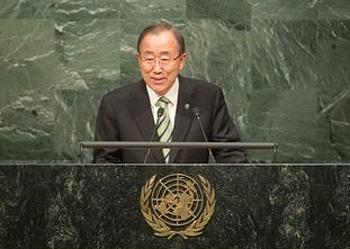
NEW YORK, New York, April 22, 2016 (ENS) – As global leaders sign the Paris Agreement on climate change today at UN Headquarters, the head of the UN Office for Disaster Risk Reduction says they must go beyond their existing commitments if the world is to avoid future catastrophic weather events.

“I welcome the fact that over 160 countries have declared they are signing up to the Paris Agreement but we are in real danger of being overtaken by the rapid pace of global warming if signatories do not significantly scale up the level of their ambition to reduce greenhouse gas emissions,” said Robert Glasser, the UN Special Representative for Disaster Risk Reduction.
“It is clear that weather and climate are implicated in 90 percent of major disaster events attributed to natural hazards. Droughts, floods, storms and heatwaves have the potential to undermine many developing states’ efforts to eradicate poverty. Climate change is adding to pre-existing levels of risk fueled by exposure and socio-economic vulnerability,” warned Glasser.
To keep the global spotlight focused on climate change and build on the momentum generated by the Paris Agreement, global leaders will participate in a signature ceremony hosted by UN Secretary-General Ban Ki-moon, who leaves office at the end of the year.
Climate change has been a signature issue for the South Korean statesman during his 10 years in the UN’s top role. The Paris Agreement and today’s signing ceremony are the crowning achievements of his leadership.

The Paris Agreement was adopted by all 196 Parties to the UN Framework Convention on Climate Change (UNFCCC) at the UN Climate Change Conference in Paris on December 12, 2015.
In the Agreement, all countries agreed to work to limit global temperature rise to well below 2 degrees Celsius, and to strive for 1.5 degrees Celsius.
More than 165 countries will sign the landmark accord, setting a record for the most countries to sign an international agreement on one day. The previous record was set in 1982, when 119 countries signed the UN Convention on the Law of the Sea.
The event coincides with “International Mother Earth Day,” more generally known as Earth Day. In his message to the world on this day, Ban said the Paris accord, in conjunction with the 2030 Agenda for Sustainable Development, “holds the power to transform our world.”
The United States, China and India, all of the world’s largest economies, and the largest greenhouse gas emitters, have indicated that they will sign the agreement today.
The signing is the first step towards ensuring that the agreement enters into force as soon as possible. After signing, countries must take the further step of accepting or ratifying the agreement on a national level.
“The momentum achieved by so many signatures on one day sends a clear signal of solidarity and resolve,” said Ban. “Now we must unleash the full force of human ingenuity and ensure low-emission growth and improved climate resilience.”
“Leadership from the top is crucial. But each of us has a role to play. We can make energy-efficient choices, stop wasting food, reduce our carbon footprints and increase our sustainable investments,” said the secretary-general.

He believes that small actions, multiplied by billions, will bring about dramatic change, bolstering the Paris Agreement “and setting us on a trajectory to achieve the Sustainable Development Goals.”
The agreement will enter into force 30 days after at least 55 countries, accounting for at least 55 percent of global greenhouse gas emissions, deposit their instruments of ratification or acceptance with the secretary-general.
Thirteen countries, mostly small island developing States, are expected to deposit their instruments of ratification immediately after signing the agreement.
Events begin with an opening ceremony starting at 8:30 a.m., which will include music from students of New York’s Julliard School and a short video bringing the “gavel moment” from Paris to the signature ceremony.
This will be followed by the signature ceremony, which is a legal formality where only Heads of State or Government, foreign ministers, or other representatives with “formal powers” from their Governments may sign the agreement. Secretary of State John Kerry is signing the agreement for the United States.

After signing the agreement, leaders will deliver their national statements, having been asked by the Secretary-General to, among other things, provide an update on how their governments will implement their national climate plans and integrate them into their overall sustainable development plans; and indicate their Governments’ timetable for ratifying the Agreement.
In the afternoon, there will be a High-Level Event on Implementation, which will focus on highlighting how all actors of society and economy can accelerate action, learn from one another, and replicate and scale successful initiatives and activities that will deliver the implementation of the Paris Agreement and the 2030 Agenda for Sustainable Development.
The session will be moderated by UNFCCC Executive Secretary Christiana Figueres, and French Environment Minister and COP 21 President Ségolène Royal.
The session will feature a link-up with the Solar Impulse aircraft that is attempting to be the first airplane to circumnavigate the world using only renewable energy.
Speaking at a press conference on Tuesday, David Nabarro, the secretary-general’s special adviser on the 2030 Agenda for Sustainable Development and Climate Change, told reporters that the signing of the Paris Agreement is crucial because achieving progress in relation to climate change is central to the broader effort of achieving the Sustainable Development Goals.
“Most people who looked at the global situation say that if we don’t succeed in maintaining the world under a 2 degrees Celsius rise, then it’s going to be incredibly difficult to realize the Sustainable Development Goals,” Nabarro warned. “And so implementing the Paris agreement is important for promoting prosperity, improving people’s wellbeing, and protecting the environment.”
Copyright Environment News Service (ENS) 2016. All rights reserved.
© 2016, Environment News Service. All rights reserved. Content may be quoted only with proper attribution and a direct link to the original article. Full reproduction is prohibited.
